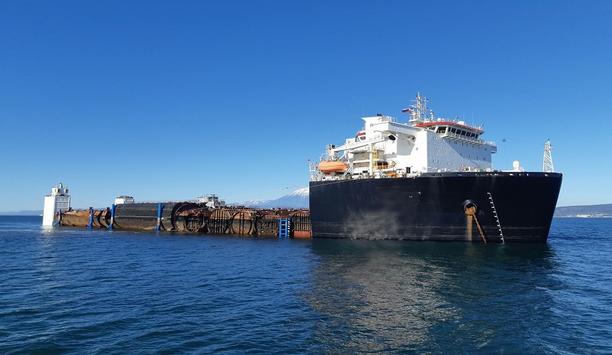Challenges
Companies experience frustrating inefficiencies in the physical movement of goods Importing and exporting fresh and frozen products involve multiple players with very diverse offerings. Global cold chains are so fragmented that companies, big and small, experience frustrating inefficiencies in the physical movement of goods.
The coordination efforts are complex with many handovers and little transparency that ultimately lead to waste of both times and some of the goods being transported.
Solution
Maersk’s response to these customer challenges is the development of an integrated cold chain logistics offering.
The ambition is to close major gaps in the supply chain and connect it through integrated end-to-end cold chain solutions that reduce cost and waste, explained Katharina Poehlmann, Global Head of Cold Chain Logistics at Maersk: “We are creating a one-stop-shop that minimises the number of parties our customers need to deal with and delivers a consistent, high-quality value proposition and customer experience,” she said.
Building on a leading position
Moving one in four refrigerated containers – commonly known as ‘reefers’ – globally, Maersk is building its cold chain offering from a position of strength. Despite a modest short-term outlook for trade growth, Maersk expects global reefer volumes to continue to significantly outgrow the dry container market in the coming years. As this projection only covers the oceanside of the cold chain, the total market represents a big opportunity for not only the Ocean business but also Logistics & Services.
“The potential in cold chain logistics really embodies what the global integrator strategy is all about. As one service provider, we can deliver differentiating value to the customers and enable them to grow their businesses,” explained Poehlmann.
Integrated offering
Maersk brand has built several cold stores and developed local, integrated customer solutions To this end, experts across Maersk are coming together to enable a truly integrated offering.
To name a few, APM Terminals are accelerating cargo flows and contributing to more visibility with intelligent use of data. Hamburg Süd and Sealand have extensive reefer insights, strong customer relationships, and fast ocean connections on key reefer trade routes which allow tailormade offerings.
Inland Services, an offering originating from APM Terminals and going to market under the Maersk brand as of August 2019, has built several cold stores and developed local, integrated customer solutions, which are being integrated into the end-to-end proposition.
In addition, Maersk’s assets make the value proposition stand out in the market, for instance with the ability to prioritise equipment and slots on the vessels and to provide cold storage at critical points of customers’ supply chains.
Making cold chains unbreakable
In many markets, cold storage providers operate very locally. Customers therefore must engage with several providers across geographies and the many handovers cause breaks in the cold chain.
To close this gap in these markets, Maersk is investing in more and better storage options that will establish unbroken, connected cold chains from farm to supermarket. These facilities enable customers to store the produce closer to consumers, provide access to special capabilities such as blast freezing, boxing, repacking and labelling, and create the ability to balance supply and demand over time.
Maersk operates cold stores in several regions and the footprint is growing across the globe Today, Maersk operates cold stores in several regions and its footprint is growing with numerous development projects ongoing across the globe.
“While our immediate focus is on regions that need quality storage here and now, our long-term ambition is to have a global footprint that can meet customers’ need for high-quality capacity on a global scale,” added Poehlmann.
Growth plan
The growth plan is being realised through a mix of acquisitions, greenfield investments, and expansion of existing facilities. The next cold store to join Maersk’s network in 2020 is located in St. Petersburg, Russia.
40% of the 23,700 square meter facility will be dedicated to Fyffes, Europe’s leading banana importer and a Maersk customer, while the remaining capacity will help meet the high demands for storing and distribution of fish, meat, as well as fruit and vegetables across Russia.
Technology increases transparency
The integrated cold chain offering is based on the latest digital innovations and reefer technology that are enabling increased transparency for customers, both inside and outside the container.
With the introduction of a virtual assistant, Captain Peter, in late 2019, the customer experience will become even better. The AI-enabled avatar will assist customers along the cargo journey by keeping an eye on the container’s temperature, humidity, and CO2 levels.
Client feedback
The full visibility on the container is an additional “insurance” that the cargo will make it to its destination Wiskerke Onions has been one of the key customers involved in the development of Captain Peter. The increased visibility makes a business-critical difference to the Dutch onion exporter:
“I choose Maersk and Captain Peter over others because I can see what is happening with my cargo. It takes months to grow onions and they can’t be easily replaced if they spoil during transport. The full visibility on the conditions in the container is an additional “insurance” that our cargo will make it to its destination in perfect condition,” said Chayenne Wiskerke, CEO of Wiskerke Onions.
Cargo visibility improving outside the container
For instance, a newly formed partnership with JDA on advanced warehouse management systems brings full visibility to cold storage facilities.
The data transparency allows customers to sharpen their operations by improving processes and lowering inventory costs.










